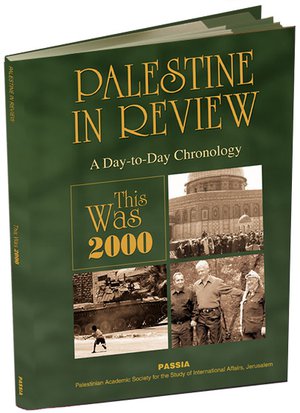Palestine in Review – This Was 2000 A Day-to-Day Chronology
This Was 2000 provides a comprehensive and chronological account of the events that un¬folded during the year 2000 and the players that shaped the year from a Palestinian perspec¬tive. In doing so, it places events in the wider regional and global contexts in order to allow for a broader perspective of interconnected local, regional and world events, thereby making the book a unique reference volume. 2000 is a year that will be remembered for the outbreak of the Al-Aqsa Intifada and the collapse of the Oslo peace process, which was characterized by a culture of negotiations. De¬spite events such as the Pope’s visit to the Holy Land, the Camp David II talks, and the attempts to formulate and employ vague formulas relating to the establishment of a Palestinian state, the overwhelming images of 2000 will remain those of hundreds of Palestinian martyrs and thousands of wounded, ongoing demonstra¬tions of Israel’s military might, and the further Bantustanization of the West Bank and Gaza Strip through con¬tinuous settlement expansion and the erection of countless checkpoints.
Overview
Dr. Mahdi Abdul Hadi
Head of PASSIA, Jerusalem
As part of its ongoing endeavor to contribute to research and documentation, PASSIA, in early 2000, was proud to publish one of its major works entitled 100 Years of Palestinian History, a chronicle of events within or related to Palestine and the Palestinians as they occurred - be they in Jerusalem, the rest of Palestine, the wider Arab region, or the international context - throughout the 20th Century.
Based on the positive feedback generated by the book as well as on the need to continue documenting - and thus preserving - Palestinian contemporary history, PASSIA decided to produce and publish annual follow-up volumes reviewing the yearly events in Palestine in a series of commemorative yearbooks. As part of this project - entitled Palestine in Review - PASSIA is pleased to present here the first volume, THIS WAS 2000.
THIS WAS 2000 provides a comprehensive and chronological account of the events that unfolded during the year 2000 and the players that shaped the year from a Palestinian perspective. In doing so, it places events in the wider regional and global contexts in order to allow for a broader perspective of interconnected local, regional and world events, thereby making the book a unique reference volume.
THIS WAS 2000 is thus a day-by-day snapshot of a year that will be remembered as the year in which the Al-Aqsa Intifada began and the Oslo peace process, which was characterized by a culture of negotiations, collapsed. Despite events such as the Pope’s visit to the Holy Land, the Camp David II talks, and the attempts to formulate and employ vague formulas relating to the establishment of a Palestinian state, the overwhelming images of 2000 will remain those of hundreds of Palestinian martyrs and thousands of wounded, ongoing demonstrations of Israel’s military might, and the further Bantustanization of the West Bank and Gaza Strip through continuous settlement expansion and the erection of countless checkpoints.
I feel I should make it clear that PASSIA by no means claims to have covered every single relevant incident in this volume; on the one hand, the chronological recording of contemporary history is obviously a subjective undertaking, while on the other, it is very possible that we could have inadvertently failed to record a particular incident or else simply not been aware of it. We nevertheless believe that we have produced another important historical document, in this case, one containing facts and figures relating to events as they occurred or were brought into being during the course of the year 2000. As always, we have tried our best to uphold our deep commitment to objectivity and can only apologize in advance for any errors that the reader may encounter.
I would like to conclude by expressing my appreciation of the commendable dedication and enthusiasm displayed by the PASSIA team that worked on the Palestine in Review project in general and on this issue in particular. Special thanks also go to the Friedrich Ebert Foundation (FES), Jerusalem, for the kind support that made the printing and binding of this volume possible

